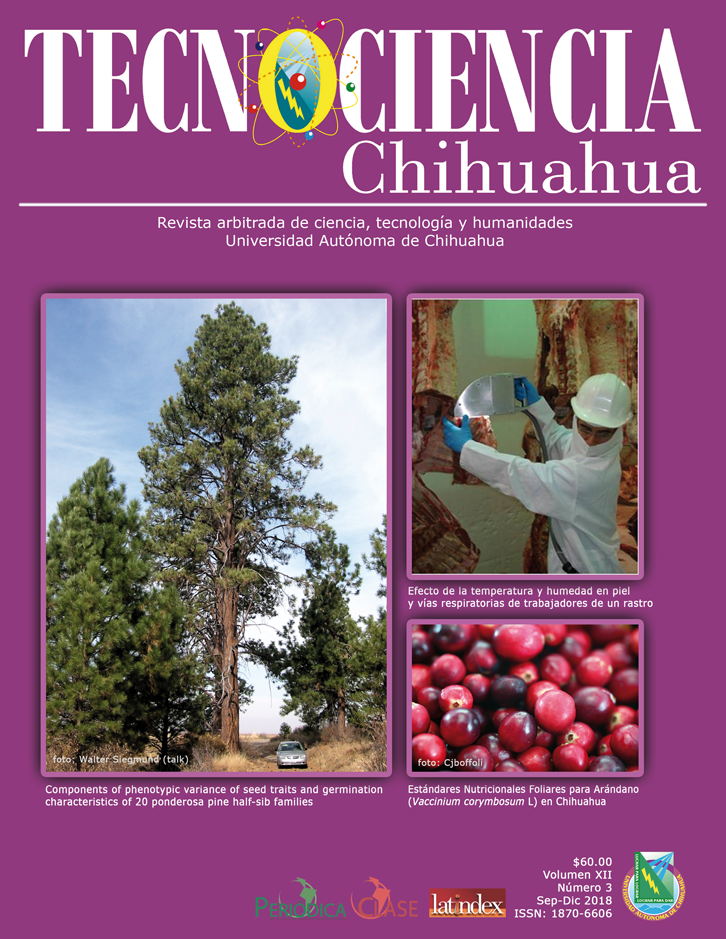Components of phenotypic variance of seed traits and germination characteristics of 20 ponderosa pine half-sib families
Componentes de varianza fenotípica de características de semilla y germinación de 20 familias de medios hermanos de pino ponderosa
DOI:
https://doi.org/10.54167/tch.v12i3.189Palabras clave:
germination timing, peak value, Weibull parameters, within- family variationResumen
A study was conducted to estimate phenotypic variance components of seed traits and seed vigor of 20 ponderosa pine seed lots. A high intraspecific within-group variation in seed germination and seedling growth has been observed in both half-sib and full-sib families of conifers. Some seed traits may influence seed lot quality and seedling survival. Wind-pollinated cones were collected from 20 ponderosa pine maternal trees, 10 cones per tree, in a stand located in Fort Defiance, Arizona. Air-dried seeds were sown under laboratory conditions, by using a completely randomized design to estimate components of phenotypic variance for seed weight (SW), seed coat weight (SCW), seed imbibition (IMB), five germination characteristics, and three Weibull parameters (a, b and c). About 80 % of size classes had a seed weight (SW) e» 41 mg and e» 97 % final germination. The within-plot (within- family) variance component for SW (64.5 %) and IMB (70.4 %) was higher than among-family variation (35.3 and 24.8 %, respectively). The among-family component varied from 35.1 % (Weibull parameter a) to 62.3 % (Peak Value). Results suggest a significant maternal contribution and a high within-family genetic influence on seed quality and germination characteristics. Finally, heavier seeds (SW e» 60 mg), whose time of germination (TOG) occurred at day 3, increased 38.3 % of their seed weight due to water absorption before reaching 50 % germination; on the other hand, seeds whose SW was e» 45 mg and TOG = 7, showed 102.2 % increase in SW before reaching 50 % germination.
Descargas
Citas
Ager, A.A. & R.F. Stettler. 1983. Local variation in seeds of ponderosa pine. Canadian Journal of Botany 61(5):1337-1344. https://doi.org/10.1139/b83-141
Bahler, C., R.R. Hill, Jr. & R.A. Byers. 1989. Comparison of logistic and Weibull functions: The effect of temperature on cumulative germination of alfalfa. Crop Science 29(1):142-146. https://doi.org/10.2135/cropsci1989.0011183X002900010032x
Bai, Y., D. Thompson & K. Broersma. 2004. Douglas fir and ponderosa pine seed dormancy as regulated by grassland seedbed conditions. Journal of Range Management 57(6):661-667. http://dx.doi.org/10.2307/4004025
Banerjee, S. & J. Maze. 1988. Variation in growth within and among families of Douglas-fir through a single season. Canadian Journal of Botany 66(12):2452-2458. https://doi.org/10.1139/b88-333
Barnett, J.P. 1997. Relating pine seed coat characteristics to speed of germination, geographic variation, and seedling development. Tree Planters´ Notes 48(1&2):38-42. https://www.fs.usda.gov/research/treesearch/1478
Benjamin, L.R. 1990. Variation in time of seedling emergence within populations: A feature that determines individual growth and development. Advances in Agronomy 44:1-25. https://doi.org/10.1016/S0065-2113(08)60816-0
Bonner, F.T. & T.R. Dell. 1976. The Weibull function: A new method of comparing seed vigor. Journal of Seed Technology 1:96-103.
Bramlett, D.L., R.R. Dell & W.D. Pepper. 1983. Genetic and maternal influences on Virginia pine seed germination. Silvae Genetica 32:1-4. https://www.thuenen.de/media/institute/fg/PDF/Silvae_Genetica/1983/Vol._32_Heft_1-2/32_1-2_01.pdf
Davidson, R.H., D.G.W. Edwards, O. Sziklai & Y.A. El-Kassaby. 1996. Genetic variation in germination parameters among populations of pacific silver fir. Silvae Genetica 45(2-3):165-171. https://treegenesdb.org/Publication/53086
Durzan, D.J. 1983. Metabolism of tritiated water during imbibition and germination of jack pine seeds. Canadian Journal of Forest Research 13(6):1204-1218. https://doi.org/10.1139/x83-159
Gosling, P.G. 1988. The effect of moist chilling on the subsequent germination of some temperate conifer seeds over a range of temperatures. Journal of Seed Technology 12(1):90-98. https://www.cabi.org/ISC/abstract/19920661011
Gummerson, R.J. 1989. Seed-bed cultivations and sugar-beet seedling emergence. The Journal of Agricultural Science 112(2): 159–169. http://doi.org/10.1017/S0021859600085051
Heidmann, L.J. & S.M. Haase. 1989. Causes of mortality in outplanted ponderosa pine container seedlings in the southwest. Tree Planters´ Notes 40(3):16-19. https://bit.ly/3Sme59k
Hoff, R.J. 1987. Dormancy in Pinus monticola seed related to stratification time, seed coat, and genetics. Canadian Journal of Forest Research 17(4):294-298. https://doi.org/10.1139/x87-049
King, J.E. & D.J. Gifford. 1997. Amino acid utilization in seeds of loblolly pine during germination and early seedling growth (I. Arginine and Arginase Activity). Plant Physiology 113(4):1125-1135. https://doi.org/10.1104/pp.113.4.1125
Ky-Dembele, C., M. Tigabu, J. Bayala, & P.C. Odén. 2014. Inter- and intra-provenances variations in seed size and seedling characteristics of Khaya senegalensis A. Juss in Burkina Faso. Agroforestry Systems 88:311-320. https://doi.org/10.1007/s10457-014-9684-7
Kuehl, R.O. 1994. Statistical principles of research design and analysis. Duxbury Press. ISBN 978-0534188047.
Larson, M.M. 1963. Initial root development of ponderosa pine seedlings as related to germination date and size of seed. Forest Science 9(4):456-460. https://academic.oup.com/forestscience/article-abstract/9/4/456/4746638
Long, T.J. & R.H. Jones. 1996. Seedling growth strategies and seed size effects in fourteen oak species native to different soil moisture habitats. Trees 11:1-8. https://doi.org/10.1007/s004680050051
Matziris, D. 1998. Genetic variation in cone and seed characteristics in a clonal seed orchard of Aleppo pine grown in Greece. Silvae Genetica 47(1):17-41.
Maze, J., S. Banerjee & Y.A. El-Kassaby. 1989. Variation in growth rate within and among full-sib families of Douglas-fir (Pseudotsuga menziesii). Canadian Journal of Botany 67(1):140-145. https://doi.org/10.1139/b89-021
Maze, J. & S. Banerjee. 1989. A comparison of variation Pseudotsuga menziesii seedlings from genetically defined and undefined sources. Canadian Journal of Botany 67(3):945-947. https://doi.org/10.1139/b89-125
McLemore, B.F. 1966. Temperature effects on dormancy and germination of loblolly pine seed. Forest Science 12(3):284-289. https://academic.oup.com/forestscience/article-abstract/12/3/284/4709437?redirectedFrom=fulltext
Mexal, J.G. & J.T. Fisher. 1987. Size hierarchy in conifer seedbeds. 1. Time of emergence. New Forest 1:187-196. https://doi.org/10.1007/BF00118756
Moore, M.B. & F.A. Kidd. 1982. Seed source variation in induced moisture stress germination of ponderosa pine. Tree Planters´ Notes 33(1):12-14. https://rngr.net/publications/tpn/33-1/33_1_12_14.pdf
Mtambalika, K., C. Munthali, D. Gondwe & E. Missanjo. 2014. Effect of seed size of Afzelia quanzensis on germination and seedling growth. International Journal of Forestry Research 2014:1-5. https://doi.org/10.1155/2014/384565
Parker, W.C., T.L. Noland, & A.E. Morneault. 2006. The effect of seed mass on germination, seedling emergence, and early seedling growth of eastern white pine (Pinus strobus L.). New Forests 32:33-49. https://doi.org/10.1007/s11056-005-3391-1
Pasquini, N.M. & G.E. Defossé. 2012. Effects of storage conditions and pre-chilling periods on germinability of Pinus ponderosa seeds from Patagonia, Argentina: preliminary study. Bosque 33(1):99-103. https://doi.org/10.4067/S0717-92002012000100012
Perry, T.O. 1976. Maternal effects on the early performance of trees progenies. En Tree physiology and yield improvement (pp. 474-481). Academy Press. ISBN 9780121587505
Perry, T.O. and W.L. Hafley. 1981. Variation in seedling growth rates: Their genetic and physiological bases. En Proceedings: Southern Forest Tree Improvement Conference (pp. 288-301). Louisiana State University, Division of Continuing Education in Cooperation with Southern Forest Experiment Station, USDA, Forest Service.
Ranal, M. & D. Garcia de Santana. 2006. How and why to measure the germination process? Brazilian Journal of Botany 29(1):1-11. https://doi.org/10.1590/S0100-84042006000100002
Rink, G., R.R. Dell, G. Swuitzer & F.T. Bonner. 1979. Use of the Weibull function to quantify sweetgum germination data. Silvae Genetica 7:319-329. https://www.thuenen.de/media/institute/fg/PDF/Silvae_Genetica/1979/Vol._28_Heft_1/28_1_09.pdf
Roach, D. & R. Wulff. 1987. Maternal effects in plants. Annual Review of Ecology and Systematics 18:209-235. https://doi.org/10.1146/annurev.es.18.110187.001233
Silen, R. & C. Osterhaus. 1979. Reduction of genetic base by sizing of bulked Douglas-fir seed lots. Tree Planters´ Notes 30(1):24-30. https://rngr.net/publications/tpn/30-1/30_1_24_30.pdf
Sorensen, F.C. & R.K. Campbell. 1985. Effect of seed weight on height growth of Douglas-fir [Pseudotsuga menziesii (Mirb.) Franco var. menziesii] seedlings in a nursery. Canadian Journal of Forest Research 15(6):1109-1115. https://doi.org/10.1139/x85-180
Sorensen, F.C. & D.W. Cress. 1994. Effects of sib mating on cone and seed traits in coastal Douglas-fir. Silvae Genetica 43(5-6):338-345.
St. Clair, J.B. & W.T. Adams. 1993. Family composition of Douglas-fir nursery stock as influenced by seed characters, mortality, and culling practices. New Forests 7:319-329. https://www.fs.usda.gov/research/treesearch/4959
Tillman-Sutela, E. & A. Kauppi. 1995. The morphological background to imbibition in seeds of Pinus sylvestris L. of different provenances. Trees 9: 123-133. https://doi.org/10.1007/BF02418201
Timonin, M.I. 1964. Interaction of seed-coat microflora and soil microorganisms and its effects on pre- and post-emergence of some conifer seedlings. Canadian Journal of Microbiology. 10(1):17-22. https://doi.org/10.1139/m64-003
Terskikh, V.V., J.A. Feurtado, C. Ren, S.R. Abrams & A.R. Kermode. 2005. Water uptake and oil distribution during imbibition of seeds of western white pine (Pinus monticola Dougl. Ex D. Don) monitored in vivo using magnetic resonance imaging. Planta 221(5):17-27. https://doi.org/10.1007/s00425-004-1426-z
Weber, J.C. & F.C. Sorensen. 1992. Geographic variation in speed of seed germination in central Oregon ponderosa pine (Pinus ponderosa Dougl. Ex Laws.). Pacific Norwest Forest & Range Experiment Station. Research Paper PNW-RP-444. USDA, Forest Service. https://doi.org/10.2737/PNW-RP-444
Woodstock, L.W. 1988. Seed imbibition: A critical period for successful germination. Journal of Seed Technology 12(1):1–15.
Publicado
Cómo citar
-
Resumen360
-
PDF42
-
HTML9

















